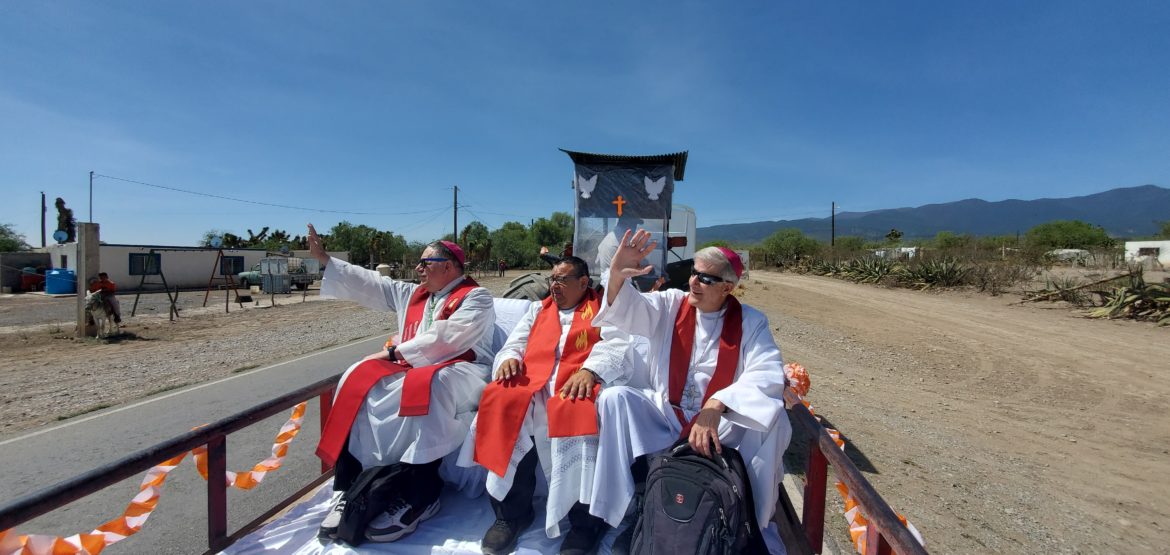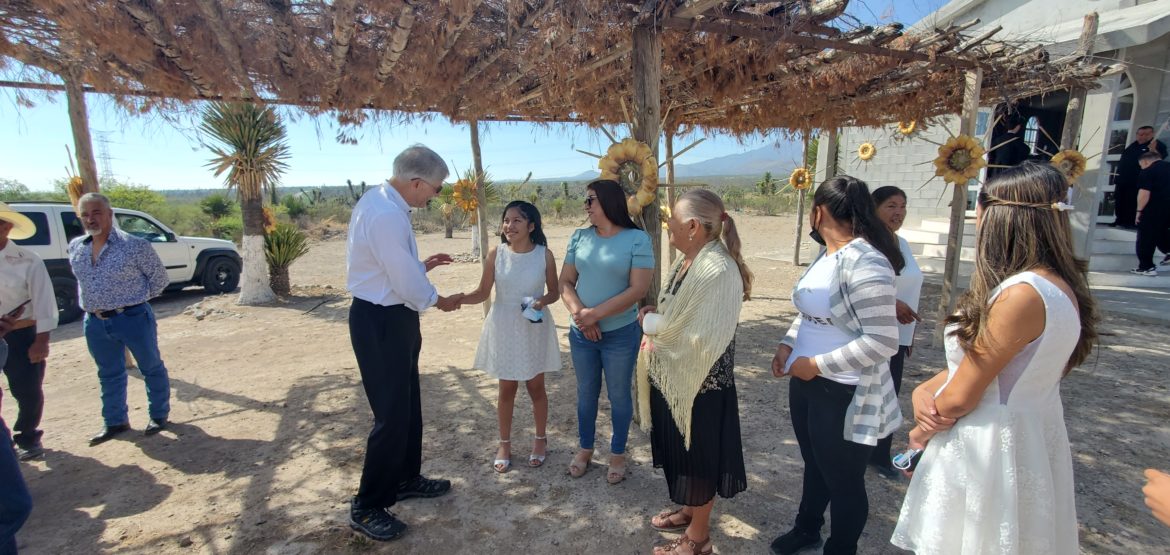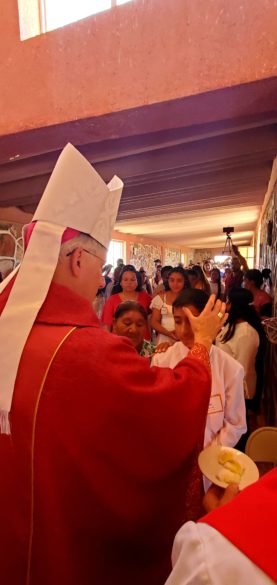Por Obispo Joseph R. Kopacz, D.D.
El regreso después de tres años a nuestra Misión de Saltillo, desde la visita anterior por el 50 aniversario del inicio de la obra misionera del Padre Patrick Quinn en 1969, fue una aventura alegre y de mucho ánimo. Muchos de ustedes saben de esta visita pastoral a través de las redes sociales de las Diócesis de Jackson y de Biloxi. Si una imagen vale más que mil palabras, entonces ya has disfrutado de múltiples representaciones del torbellino de cuatro días. Es asombroso considerar el alto volumen de actividad que ocurre en un marco de tiempo tan compacto. Puede ser agotador y estimulante sobre cada bache del camino.

Permítanme hacer una digresión por un momento para atesorar la fuente del vínculo espiritual que continúa prosperando entre Mississippi y Saltillo, incluso en ausencia de viajes misioneros por tierra.
En nuestro mundo católico, estamos en medio de la celebración del triángulo dorado de Solemnidades excepcionales que comienzan con el Domingo de Pentecostés y la culminación del tiempo de Pascua, la Solemnidad de la Santísima Trinidad y la Solemnidad del Cuerpo y la Sangre del Señor.
El don del Espíritu Santo recibido en la fe y celebrado de manera única en Pentecostés abre un mundo de misterio con nuestro Dios que es amor, la Santísima Trinidad de personas que desbordó en amor en los dones de la creación y la salvación. La celebración del Corpus Christi continúa esta efusión de amor derramada en la Cruz, conmemorada y vivida cada vez que nos reunimos para la Misa, la Sagrada Eucaristía.
Las tres fiestas juntas revelan la naturaleza del amor dentro de la Trinidad que se manifiesta en la comunidad cristiana, la unidad, la comunión y la fraternidad en el Cuerpo de Cristo en todo el mundo unidos por una fe, un bautismo, un Dios que es Padre que es todo y sobre todos. Así, la alegría de la solidaridad y la unidad puede desbordarse con cada liturgia, cada fiesta, cada comida y cada conversación en todas partes de nuestro mundo.
Desde esta fuente de fe, esperanza y amor, todos atesoramos la historia de estos últimos 53 años, la memoria del Padre Quinn y todos los que se han entregado, de aquí y allá, ya sea durante años o semanas.
El Sacramento de la Confirmación con 80 candidatos fue la liturgia culminante con el recién instalado ordinario Obispo Hilario Gonzales García, de la Diócesis de Saltillo. Fue alentador concelebrar con él alrededor del altar y pasar tiempo en la mesa después. Un año en su ministerio episcopal y ya ha experimentado las bendiciones de la relación que Jackson y Biloxi tienen con su diócesis. Él apoya totalmente lo que estamos haciendo y espera que nos acompañemos en el futuro.
Todos esperamos que llegue el día en que los viajes misioneros por tierra puedan reanudarse, permitiendo que una nueva generación de católicos de Mississippi sean discípulos misioneros, evangelizando y siendo evangelizados por nuestros hermanos y hermanas mexicanos en el Señor.
En medio de los muchos momentos llenos de gracia, comidas y ministerios de la Confirmación, del lunes al jueves por la noche hubo varios eventos emblemáticos. El martes celebramos el Sacramento de la Confirmación dos horas en Nuestra Señora de Guadalupe en Garambullo y luego regresamos a una liturgia especial en San Miguel que honró a todos los padres presentes con una bendición especial mientras los mariachis tocaban y cantaban a todo pulmón y sin piedad.
Luego, siguió una fiesta en honor a los jóvenes que recaudaron la mayor cantidad de dinero para sus comunidades parroquiales individuales. Diversos grupos de animadores, en su mayoría jóvenes, actuaron espléndidamente en canto, danza y gestualidad en una fiesta religiosa y cultural. ¡Qué Buena noche!
El miércoles vio otro evento memorable desarrollarse ante nosotros con asombro. De camino a San Pedro para recibir el Sacramento de la Confirmación, nos reunimos en la Capilla de San José, que fue dedicada hace tres años en la última visita pastoral. Después de la oración y las bendiciones, los autos y camiones se organizaron en una procesión que se convirtió en una flotilla en el camino a San Pedro. Espero hayas visto algunas de las fotos y toda la experiencia fue tan alegre como parecía. Los frutos y dones del Espíritu Santo abundaron en la Confirmación que siguió.
El jueves anterior a la Confirmación, el obispo Kihneman y yo, junto con otros peregrinos de Jackson y Biloxi visitamos la tumba del Padre Quinn en la Iglesia del Perpetuo Socorro. Durante el año pasado, las paredes traseras de la iglesia sobre su tumba se cubrieron con fotos que brindan un panorama de los eventos, las personas y los lugares de los años del padre Quinn. Está bien hecho y es muy conmovedor.
Mientras permanecía allí admirado, me sentí muy agradecido de ser parte de esta increíble historia cuyos capítulos aún se están escribiendo y de representar a los fieles de nuestra diócesis que promueven la misión a través de la oración y la generosidad.
El próximo año marcará el 25 aniversario de San Miguel, la parroquia fundamental de la misión desde la muerte del padre Quinn y las fechas están en el calendario para la celebración del aniversario de septiembre de 2023. ¡Manténganse al tanto!




